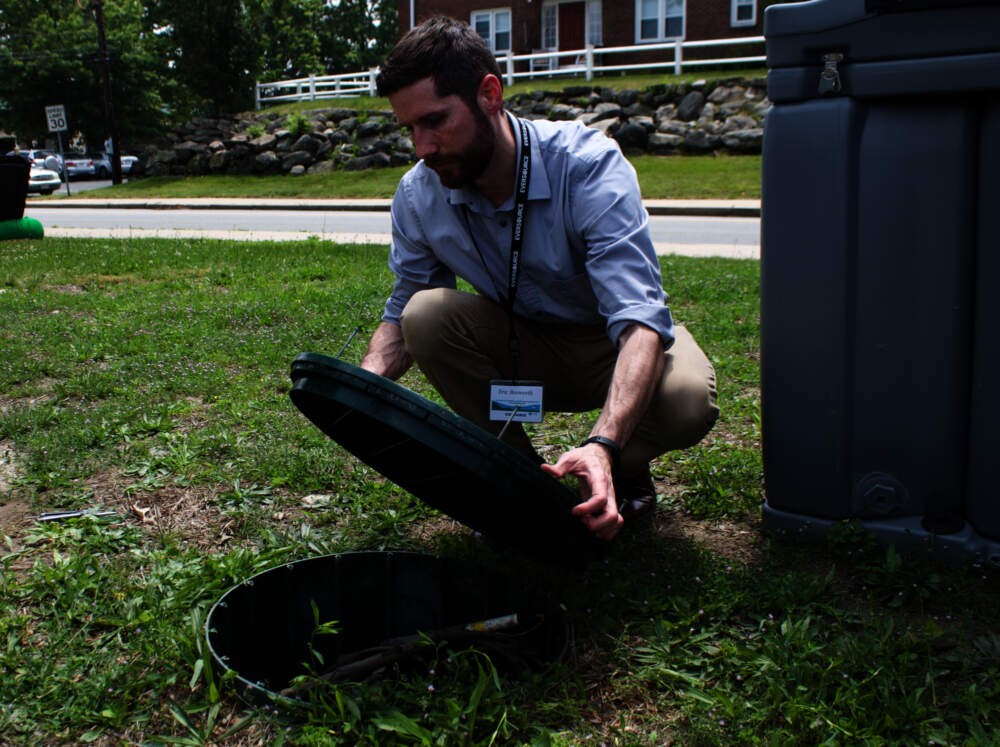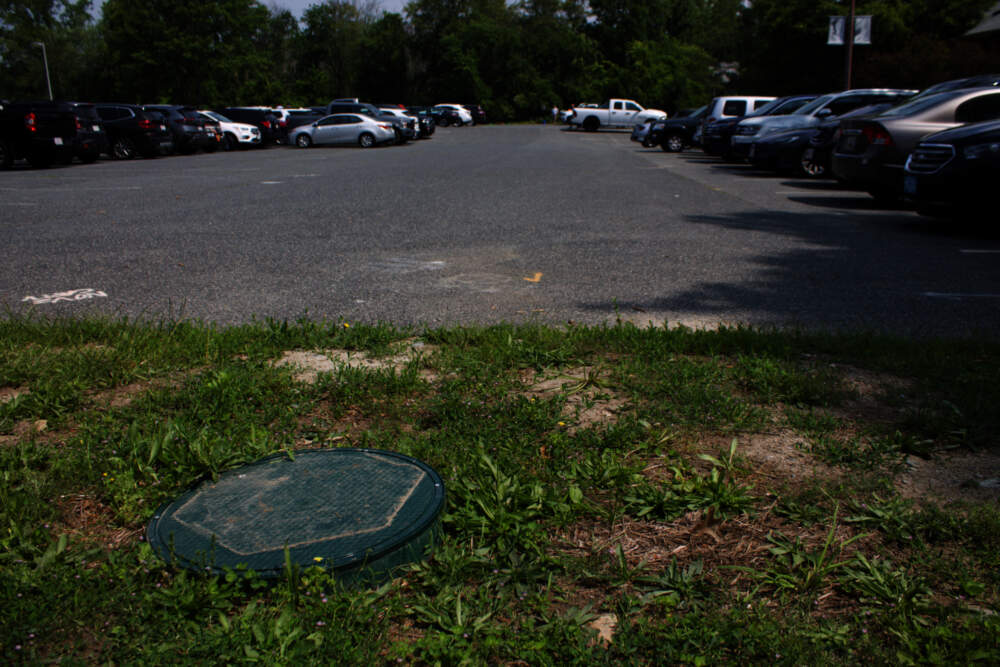Advertisement
The country’s first gas utility-run networked geothermal heating and cooling system breaks ground in Mass.

New England’s largest energy utility, Eversource, is on its way to becoming the first gas utility in the country to build and run a “networked geothermal system.” The pilot project, which broke ground this week in Framingham, will use a network of deep wells and pipes to provide climate-friendly heating and cooling for 37 buildings.
If successful, advocates say they hope the model can be scaled to help the state meet its clean energy goals and provide a new business opportunity for gas utilities as the country weans itself off of fossil fuels.
“As we transition to a carbon-free future, this is going to be the answer,” said Eversource CEO Joe Nolan at a ceremony on Monday celebrating the project. “We save energy, we reduce peoples’ carbon footprint and we have a better, cleaner environment going forward.”
A “networked geothermal” system is, as its name suggests, a network of “geothermal” or “ground-source” heat pumps. (Think of a heat pump like an air conditioner that can also run in reverse.) The heat pumps are fed by water-filled pipes that run under the street between homes and 600-foot wells in the ground. At that depth, the earth is a constant 55 degrees Fahrenheit.
“In the winter, you're using water to pull heat out of the ground, move it through the loop, and send it into a home where a heat pump will concentrate that heat and keep the home warm,” said Eric Bosworth, a senior program manager in Eversource’s Clean Technologies Department.
“It does the exact same thing in the summer, but in reverse — it's pulling heat out of the home to cool it, sending it through the loop and then back underground.”
Ground-source heat pumps are more efficient than conventional “air-source” heat pumps because the temperature underground is consistent so the system doesn’t have to work as hard to heat or cool a building — this is especially true when the temperature outside is really hot or cold. Bosworth said some customers in the pilot project could see a 20% reduction in energy bills once their homes are converted to the geothermal system.
What’s more, by switching from natural gas or heating oil to an efficient ground-source heat pump, buildings in the pilot will have fewer carbon emissions — Eversource estimates that the buildings connected to the system will slash emissions by 60%.
A geothermal system itself is emissions-free, but because the New England electric grid is mostly powered by fossil fuels, there is still some carbon pollution associated with it. Overtime, though, as the region shifts to more renewable electricity sources, those emission savings will be even larger.
“If you ran a geothermal system off of fully renewables, it would be 100% carbon free,” Bosworth said.
In a state like Massachusetts, where buildings account for nearly a third of all carbon emissions, networked geothermal systems that are powered by a renewable grid could make a big dent in the state’s climate goals.
Since getting the green light from regulators to do this pilot three years ago, Eversource has been designing the system and getting buy-in from local residents and businesses. The utility intentionally selected a dense, mix-used location for the project, since it allows it to test feasibility and assess costs with a diverse group of customers. The project area includes a low-to-moderate income apartment complex, several residential homes, a fire station, a college building and other commercial properties.
Last fall, the company drilled three 600-foot geothermal wells, which helped inform the final design of the system. The next step is to dig 110 more wells and lay about a mile of underground pipe through the neighborhood. The company will also install heat pumps in the buildings and help homeowners weatherize their homes so they’re even more energy efficient.
“Geothermal ground-source heat pumps have been around for a long time,” said Zeyneb Magavi, co-executive director of the environmental nonprofit Home Energy Efficiency Team — better known as HEET. “But their barrier to entry was that [the] upfront infrastructure cost was hard for individual homeowners.”
Magavi experienced this personally when she started looking into getting a geothermal system for her home several years ago. “I couldn’t afford the borehole,” she said. “And then I thought, well, maybe my utility could bring the energy I want.”
In 2017, Magavi and her colleague, Audrey Schulman, pitched the idea of a networked geothermal system to Eversource.
“The utility of a utility is to be able to install and pay for expensive shared infrastructure that everybody needs,” Schulman said. “So this is a way of sort of offering them candy in the direction that we want them to go, and hope they head that way with all speed.”
According to Eversource officials, the company saw the value in the idea right away.
“This project for us is really enabling our group of dedicated employees to see a way that we can provide different services in a different way and also provide clean solutions to the building sector,” said Bill Akley, President of Gas Distribution at Eversource. He added that for the workforce, there are many similarities between building and maintaining a gas pipeline system and a networked geothermal system.
In addition to maintaining jobs, supporters of the networked geothermal model say it could also help the state transition away from fossil fuels in a more equitable way. Currently, because the cost of decarbonizing a home is so expensive — even with state and federal incentives — it’s primarily more affluent people who can afford to do it. If this pattern continues, we’re likely to have a scenario in the future where the only people left using natural gas are lower or moderate-income residents. And because the fixed costs of maintaining the gas pipeline system get divided among all customers, those who are left on the system will end up paying even more for energy.
"If instead, gas companies adopt a new business model and become ‘thermal utilities,’ they can “decarbonize in a way that is more affordable, safer and is equitable [because] it allows everyone to access this better type of energy,” Schulman said.
“It’s a pilot today, but as we like to say internally, ‘it’s a roadmap for tomorrow,’ ” said Nikki Bruno, vice president of clean technologies at Eversource.

But not everyone is completely sold on the scalability of the idea. Some clean energy experts say it's important to be realistic about cost and other challenges.
“We are really excited about this pilot project and want to see the results that come from it, [but] I think we really do need to think about all options here. We can't just think, ‘oh, this is our solution,’ ” said Kyle Murray, the Massachusetts program director of the Acadia Center, a clean energy advocacy group.
“We need to be thinking creatively about all potential solutions and that does include the potential decommissioning of gas utilities in the future as well.”
For now, however, gas utilities, environmentalists and government officials around the country are watching this pilot program in Framingham to see how construction goes, what it costs and where it can feasibly be replicated.

